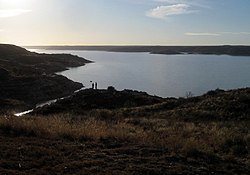Lake Meredith
| Lake Meredith | |
|---|---|

Lake Meredith in November 2009
|
|
| Location | Hutchinson / Moore / Potter counties, Texas Panhandle, Texas, US |
| Coordinates | 35°42′51″N 101°33′11″W / 35.71417°N 101.55306°WCoordinates: 35°42′51″N 101°33′11″W / 35.71417°N 101.55306°W |
| Lake type | reservoir |
| Primary inflows | Canadian River |
| Primary outflows | Canadian River |
| Basin countries | United States |
| Water volume | 779,556 acre·ft (961,568,000 m3) |
| Surface elevation | Pool 2,936.50 ft (895.05 m) |
Lake Meredith is a reservoir formed by Sanford Dam on the Canadian River at Sanford, Texas. It is about 30 miles (48 km) northeast of Amarillo, Texas in the Texas Panhandle. It historically was a major source of drinking water for Amarillo and Lubbock, Texas, located about 150 miles (240 km) to the south along with many other towns in between and nearby. In 2003, the Canadian River Municipal Water Authority announced that it would reduce allocations to its member cities due to an ongoing drought and a continued drop in the water level in the reservoir. As of 2008, the lake continued to hit record lows, and most of the water supplied by CRMWA is now coming from wells in Roberts County. In 2011, water withdrawals from Lake Meredith temporarily ceased and on August 7, 2013 the lake reached its all-time low 26.14 feet (7.97 m). The record high capacity was in April 1973 when the lake was 101.85 ft deep.
On June 1, 2008 the remains of a Beechcraft Skipper airplane were found in the receding lake. The plane, reported missing on January 27, 1984, was on a two-hour flight carrying the pilot, Steven Lampe, 25 and Larry Lucas, both of Amarillo, Texas. There had been no eyewitnesses to the crash.
Much of the political credit for the establishment of Lake Meredith has gone to the late State Senator Grady Hazlewood of Amarillo.
From its opening as a National Recreation Area up to the early 2000s, Lake Meredith was an attraction for various recreational activities, including camping, fishing and water sports of all types. Its long narrow profile and numerous coves made power boat sports (water skiing, tubing, wake boarding, etc.) especially popular. Due to the region's normally windy summer seasons, the coves were popular spots for said water sports due to their natural protection from the winds that often make the open lake waters too choppy for water sports. It also featured camping sites at at least three places around the lake and five beach areas; one only accessible by boat. Popular fishing included sand bass and walleye, though the lake had many other species of fish such as carp.
...
Wikipedia
